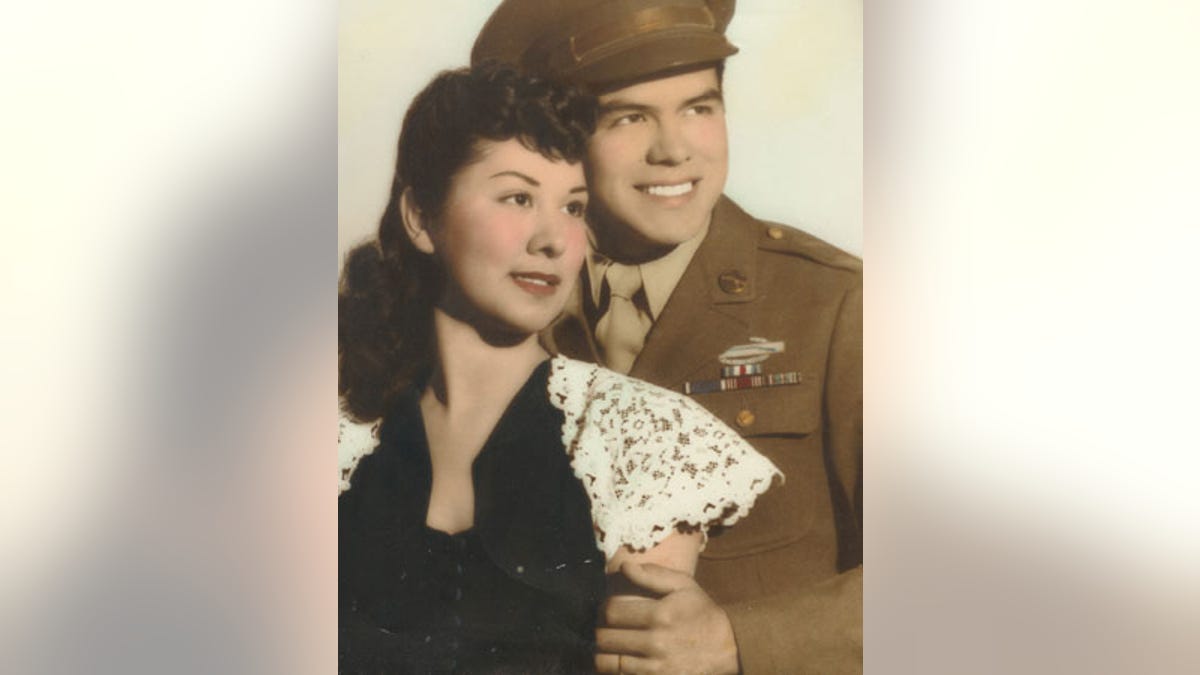
File: Angel Garcia and his wife (Angel Garcia)
On June 6, 2009, France held a commemorative ceremony for the 65th anniversary of the D-Day Allied landings at Normandy. Many say President Barack Obama was the star guest and that France's President Nicolas Sarkozy had worked hard to make sure Obama would attend.
In what many considered a snub by President Sarkozy, Britain's Queen Elizabeth, was initially not invited. A Sarkozy spokesperson said this was, "a Franco-American affair." Veterans were angered since the 83-year-old queen is the only living head of state who served in uniform during World War II. She was a military truck driver in the Women's Auxiliary Territorial Service. Obama insisted that Her Majesty be in attendance. Just days before the ceremony, Sarkozy changed his mind. But after the perceived snub, the queen stood her ground. It was announced that Prince Charles would attend the ceremony instead.
• Catch the 'War Stories Classic: Freeing France From Hitler,' Monday, June 15 at 3 a.m. ET
Much has been written about Sarkozy's love of the United States. Some even call him "Sarko L'Americain." In 2007, when he took office, he pledged to try and repair the relationship between Paris and Washington that was strained by the Iraq War. There's no doubt there are political differences between the two countries, but there's also no doubt that Sarkozy and the French people, will always be grateful for America's service and sacrifice to free France from Nazi occupation.
I saw firsthand the heartfelt thanks and appreciation of the French people in the spring of 2005, when producer Ayse Wieting, Oliver North and I flew to France to work on an episode of "War Stories" entitled "Freeing France from Hitler."
After we arrived in Paris, we met our crew and then drove several hours to our destination, the beautiful village of Mortain in Normandy. The town hasn't changed much since World War II. It is still known for its dairy farms and Camembert cheese. But during the war, the tiny village was occupied by German soldiers who launched Operation Luttich, Hitler's first counterattack against the Allies.
"Yes! I was afraid. Everybody was afraid," remembered Germain Bouillault, who was just 13-years-old when German tanks rolled through his town. "We were in the heart of the action." Noel Blin, the mayor of Mortain, said he heard stories about the occupation from his parents: "There was a constant fear of the Germans who had arrived and disturbed their peace."
On August 6, 1944, during Hitler's counterattack, 700 men of the 30th Infantry Division found themselves trapped atop Hill 314 surrounded by Hitler's elite. "War Stories" brought Angel Garcia back to the hill where he fought as a staff sergeant. The California native said, "You could hear the tanks coming up this road going 'clank, clank, clank.' And they didn't stop."
By the time he had reached Mortain, Garcia and the 30th Division had already cheated death during "Operation Cobra." But on August 7, he was tested again when 50,000 troops and 300 Panzer tanks led by General Gunther Von Kluge counterattacked the 30th Division.
Another soldier trapped on Hill 314 was Lieutenant Robert Weiss. "I don't think anybody in the rear headquarters understood how precarious our position was," the then 21-year-old forward observer said. "There we were with no food, no medical supplies, no antitank weapons, no mines, no mortars, and no bazookas."
Over the next six days, Lieutenant Weiss called in 193 fire missions.
After General Bradley learned of the dire situation, he mobilized the 35th Division. After "six agonizing days" the men were finally rescued. The 30th Division suffered 1,800 casualties. Of the 700 men who had walked up the hill, only 357 were able to walk down.
During our first evening in Mortain, Mayor Blin held a special dinner and party in honor of Angel Garcia's return. He said anytime an American soldier who helped liberate Mortain came to town, he wanted to honor them. We were each given a bottle of champagne that was made for the 60th anniversary of the liberation of Mortain. I will never forget how happy Garcia looked and how proud his son Richard, who accompanied him on the trip, was of his dad.
Garcia fought in five campaigns in France and Central Europe. He received the Combat Infantry Badge, a Bronze Star, a Silver Star, two Purple Hearts, and a Presidential Unit Citation for fighting in Mortain.
— Cyd Upson is senior producer for "War Stories"
